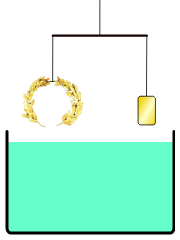
The Golden Crown
The most widely known anecdote about Archimedes tells of how he invented a method for determining the volume of an object with an irregular shape. According to Vitruvius, a new crown in the shape of alaurel wreath had been made for King Hiero II, and Archimedes was asked to determine whether it was of solid gold, or whether silver had been added by a dishonest goldsmith. Archimedes had to solve the problem without damaging the crown, so he could not melt it down into a regularly shaped body in order to calculate its density. While taking a bath, he noticed that the level of the water in the tub rose as he got in, and realized that this effect could be used to determine the volume of the crown. For practical purposes water is incompressible, so the submerged crown would displace an amount of water equal to its own volume. By dividing the weight of the crown by the volume of water displaced, the density of the crown could be obtained. This density would be lower than that of gold if cheaper and less dense metals had been added. Archimedes then took to the streets naked, so excited by his discovery that he had forgotten to dress, crying "Eureka!" (Greek: "εὕρηκα!," meaning "I have found it!")
The story of the golden crown does not appear in the known works of Archimedes. Moreover, the practicality of the method it describes has been called into question, due to the extreme accuracy with which one would have to measure the water displacement.[ Archimedes may have instead sought a solution that applied the principle known in hydrostatics as Archimedes' Principle, which he describes in his treatise On Floating Bodies. This principle states that a body immersed in a fluid experiences a buoyant force equal to the weight of the fluid it displaces. Using this principle, it would have been possible to compare the density of the golden crown to that of solid gold by balancing the crown on a scale with a gold reference sample, then immersing the apparatus in water. If the crown was less dense than gold, it would displace more water due to its larger volume, and thus experience a greater buoyant force than the reference sample. This difference in buoyancy would cause the scale to tip accordingly. Galileo considered it "probable that this method is the same that Archimedes followed, since, besides being very accurate, it is based on demonstrations found by Archimedes himself."

No comments:
Post a Comment